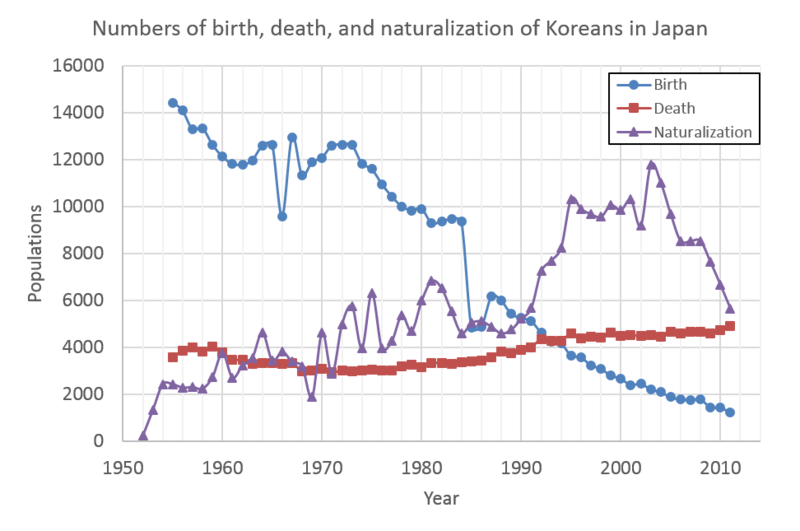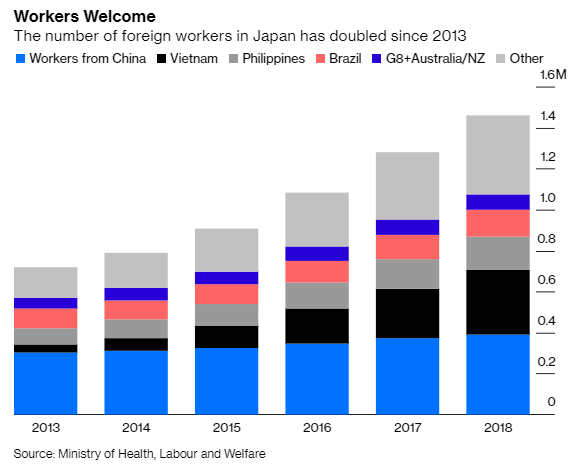1/Here's a thread of my latest blog post, on Japanese homogeneity.
Lots of people say Japan is a "homogeneous society". But how homogeneous is it really? https://noahpinion.substack.com/p/how-homogeneous-is-japan
Lots of people say Japan is a "homogeneous society". But how homogeneous is it really? https://noahpinion.substack.com/p/how-homogeneous-is-japan
2/Lots of people will tell you that Japan is "98% Japanese".
But what does that mean?
That's not a measure of ethnicity. It's a measure of NATIONALITY. It just means 98% of people living in Japan are Japanese CITIZENS.
https://en.wikipedia.org/wiki/Ethnic_groups_of_Japan
But what does that mean?
That's not a measure of ethnicity. It's a measure of NATIONALITY. It just means 98% of people living in Japan are Japanese CITIZENS.
https://en.wikipedia.org/wiki/Ethnic_groups_of_Japan
3/I mean, this number for America is 93.3%!
If someone tells you "98% of people in Japan are Japanese", it's just like saying "93.3% of people in America are American"!
https://www.kff.org/other/state-indicator/distribution-by-citizenship-status/?currentTimeframe=0&sortModel=%7B%22colId%22:%22Location%22,%22sort%22:%22asc%22%7D
If someone tells you "98% of people in Japan are Japanese", it's just like saying "93.3% of people in America are American"!
https://www.kff.org/other/state-indicator/distribution-by-citizenship-status/?currentTimeframe=0&sortModel=%7B%22colId%22:%22Location%22,%22sort%22:%22asc%22%7D
4/So how many people in Japan are ETHNICALLY Japanese.
First of all, no one really knows what that means, but more importantly, THE JAPANESE GOVERNMENT DOES NOT KEEP TRACK of the ethnicity of people living in Japan.
https://worldpopulationreview.com/countries/japan-population
First of all, no one really knows what that means, but more importantly, THE JAPANESE GOVERNMENT DOES NOT KEEP TRACK of the ethnicity of people living in Japan.
https://worldpopulationreview.com/countries/japan-population
5/This is the same as France, actually. https://www.brookings.edu/articles/race-policy-in-france/
6/So OK, there is some concept of a "Japanese" ethnicity, sometimes called "Yamato".
But Japanese people generally conflate "Yamato" with Japanese nationality, so these concepts are muddled...
But Japanese people generally conflate "Yamato" with Japanese nationality, so these concepts are muddled...
7/What percent of people in Japan are descended from people who ethnically self-identified as "Japanese" or "Yamato", as opposed to a minority group?
It's hard to tell; various sources quote 90% as the figure. https://twitter.com/Lulz4l1f3/status/1336909273524285441
It's hard to tell; various sources quote 90% as the figure. https://twitter.com/Lulz4l1f3/status/1336909273524285441
8/That's still fairly homogeneous, but it doesn't count mixed-race people who identify as "Japanese" or "Yamato" and not as members of their minority ancestry...
And 90% is about the % of white Americans in 1950.
And 90% is about the % of white Americans in 1950.
9/Also, it's worth noting that Japanese homogeneity is highly inhomogeneous (heh).
In the city of Tokyo, for example, 1 out of 8 young people wasn't born in Japan -- and that doesn't even include people who are citizens but ethnic minorities! https://www.japantimes.co.jp/news/2018/01/10/national/coming-age-1-8-new-adults-tokyo-not-japanese-ward-figures-show/#.XONggMgzZPY
In the city of Tokyo, for example, 1 out of 8 young people wasn't born in Japan -- and that doesn't even include people who are citizens but ethnic minorities! https://www.japantimes.co.jp/news/2018/01/10/national/coming-age-1-8-new-adults-tokyo-not-japanese-ward-figures-show/#.XONggMgzZPY
10/Now OK. As a Westerner, you might go to Japan and think "Uhh, most people look Asian, this is pretty homogeneous."
In fact, before COVID, you were probably looking at a bunch of Chinese tourists! https://www.nippon.com/en/japan-data/h00646/chinese-visitors-spend-%C2%A51-8-trillion-in-japan-in-2019.html
In fact, before COVID, you were probably looking at a bunch of Chinese tourists! https://www.nippon.com/en/japan-data/h00646/chinese-visitors-spend-%C2%A51-8-trillion-in-japan-in-2019.html
11/To a Westerner, ethnic differences between Japanese, Korean, and Chinese people (or Japanese-Brazilians) might not seem like big differences.
But to many people in those countries, those are BIG differences. https://www.theguardian.com/world/2014/dec/04/police-japan-rightwing-anti-korean-extremist-group-zaitokukai-watchlist
But to many people in those countries, those are BIG differences. https://www.theguardian.com/world/2014/dec/04/police-japan-rightwing-anti-korean-extremist-group-zaitokukai-watchlist
12/Imagine going to England and shrugging at discrimination against Polish people, and saying "Well, you're all just a bunch of Europeans!"... 

13/But anyway, what IS true about Japan is that many leaders want to PROMOTE homogeneity, in the form of a unified national identity.
In the words of politician Taro Aso: “one nation, one civilization, one language, one culture and one race”. https://www.theguardian.com/world/2007/mar/22/japan.justinmccurry
In the words of politician Taro Aso: “one nation, one civilization, one language, one culture and one race”. https://www.theguardian.com/world/2007/mar/22/japan.justinmccurry
14/And over time, Japan does tend to become more homogeneous.
The most famous example is that of the Zainichi Koreans, who are blending into the Japanese populace via naturalization and intermarriage.
https://en.wikipedia.org/wiki/Koreans_in_Japan
The most famous example is that of the Zainichi Koreans, who are blending into the Japanese populace via naturalization and intermarriage.
https://en.wikipedia.org/wiki/Koreans_in_Japan
15/But this homogeneity-via-nationalism, ignoring differences in ancestry, inevitably runs into a problem when Japanese people are very visually distinctive. As many increasingly are, thanks to immigration from Europe, Africa, India, etc.
16/For example, if this politician told you she was "Japanese", you probably wouldn't think about her ancestry (her dad is from Taiwan). Nor would most Japanese people.
17/And this businessman is a Japanese citizen, but his ancestors are from Korea. Again, if you didn't know, you would likely have little trouble accepting him as "Japanese".
18/But when this woman -- a Japanese citizen with a Black American dad -- won the Miss Universe pageant, it prompted a racist backlash, and a big online debate about who was really Japanese.
19/To learn about the experiences of half-Japanese people in Japan, I recommend this documentary:
http://hafufilm.com/en/
http://hafufilm.com/en/
20/Fortunately, for now, the racists seem to be losing; another beauty queen with one Indian parent faced much less of a backlash in 2016. https://www.firstpost.com/entertainment/priyanka-yoshikawa-is-crowned-miss-japan-faces-social-media-backlash-2992576.html
21/And Japan is making big progress in cracking down harshly on racist hate groups. https://www.japantimes.co.jp/news/2019/12/12/national/crime-legal/kawasaki-first-japan-bill-punishing-hate-speech/
22/So to sum up: Japan is not an island of racial purity. Instead, it is a fairly normal rich country, dealing with fairly normal issues of immigration, diversity, minority rights, racism, and nationhood.
23/A lot of the debates about these issues look pretty similar to what you'd see in Europe -- or even the U.S. https://www.bloomberg.com/news/articles/2020-12-09/nike-nke-brings-social-justice-ads-to-japan-the-results-are-mixed?sref=R8NfLgwS
24/It's true that Japan was a bit later than Europe to get on the immigration train. It didn't really open up until 2013. But now it's catching up, and undergoing much the same changes and challenges.
25/And although Japan's leaders WANT to create homogeneity through national identity and assimilation, their policies for doing so look much gentler than, say, Denmark's. https://qz.com/1320234/denmarks-new-laws-targeting-ghetto-children-show-how-assimilation-is-becoming-mandatory/
26/It's not clear how immigration will change Japan -- how Japanese identities will change, who will be thought of as a minority, etc.
But Japan is not the island of xenophobic racial purity that many Westerners imagine.
That is fantasy.
https://noahpinion.substack.com/p/how-homogeneous-is-japan
(end)
But Japan is not the island of xenophobic racial purity that many Westerners imagine.
That is fantasy.
https://noahpinion.substack.com/p/how-homogeneous-is-japan
(end)

 Read on Twitter
Read on Twitter







